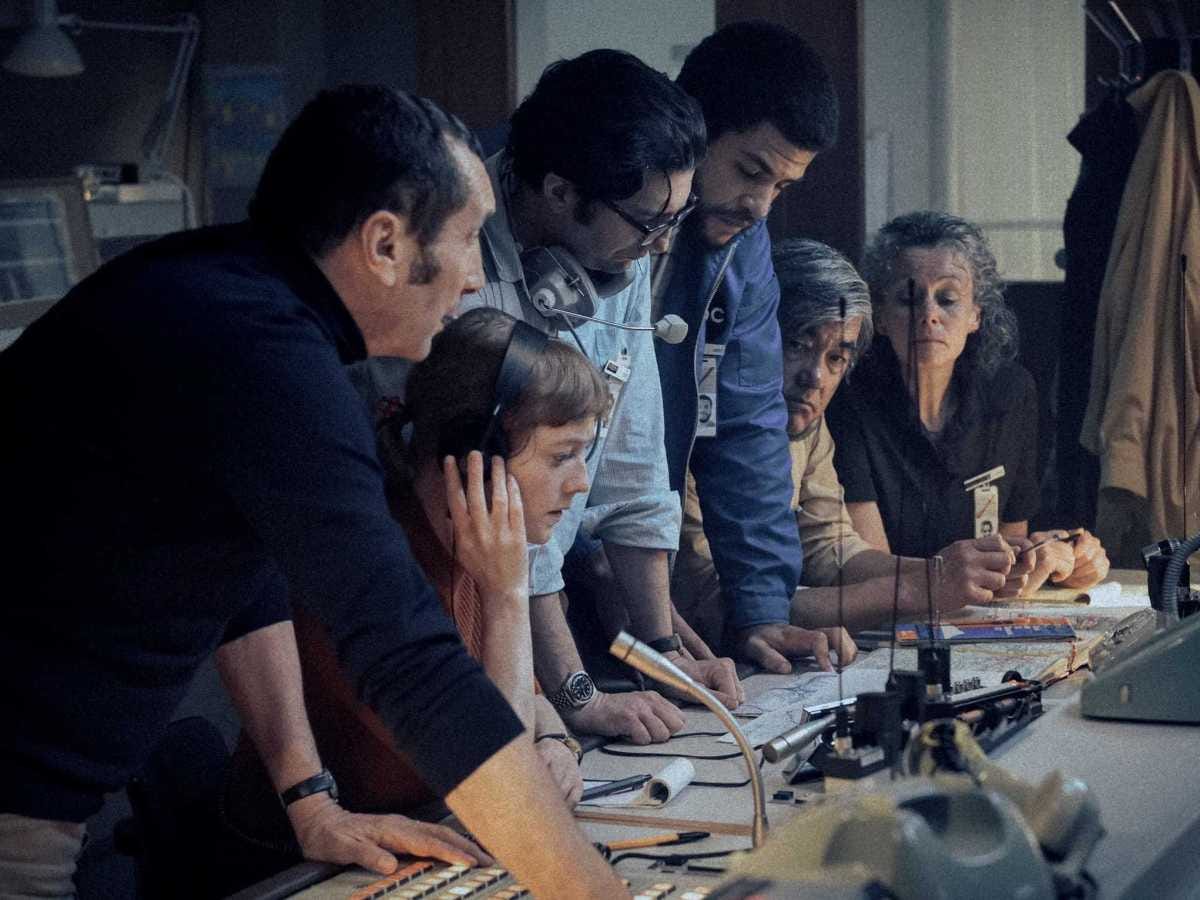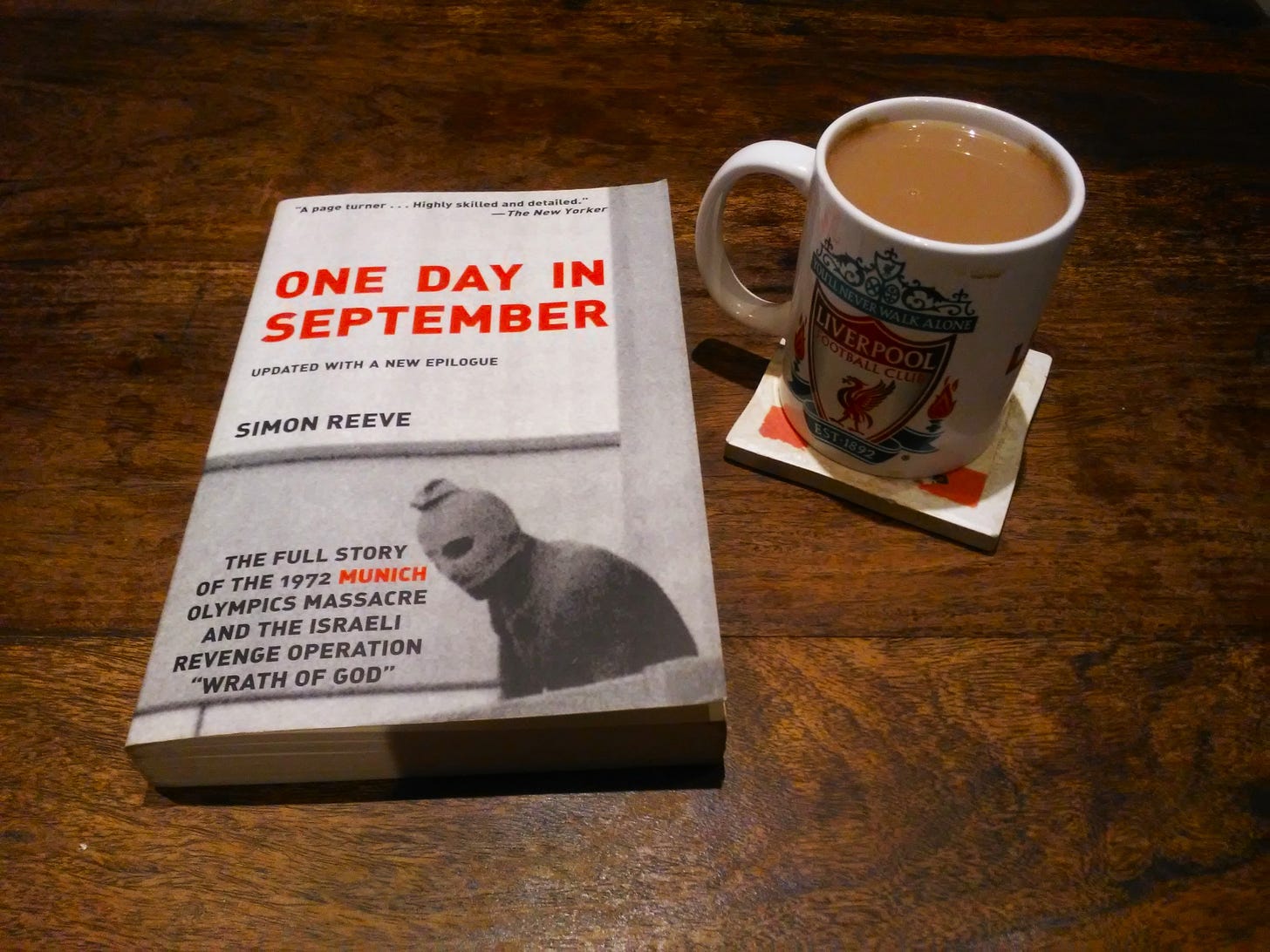September 5 (2024)
One Day in September and Tim Fehlbaum’s Oscar nominated telling of an Olympic tragedy

Before we dive into the film and as I’ve only recently finished re-reading this modern classic, can I recommend the book below as well as the documentary of the same name that came before it in 1999 and the Steven Spielberg film “Munich” that followed in 2005?
Following sparse and sombre white on black opening credits the film bursts into life in a 4:3 framed ratio and real life stock footage of ABC Sports ongoing coverage of the 1972 Munich Olympic Games. After 9 days of competition, the “Serene Games” are highlighted on a showreel of the time, both the art of sporting competition as well as a peak behind the television curtain as a satellite “bird” beams ABC’s coverage “live and in colour” back to America, and all around the world. From the firing of a starters pistol we now dissolve from the 4:3 ratio to traditional widescreen and the ABC Sports Studio covering American swimmer Mark Spitz making Olympic history with his 7th Gold medal win as we see a cinematic re-creation for the first time of the inner workings of the studio. Multiple screens showcase groundbreaking camera angles for the time as various technicians assist the operations manager and television director as they conduct a seamless television production for their audience, moving from camera to camera, the beaten German swimmer to the victorious American, now out of the pool, celebrating with his family, and with the televisual spectacle complete, we cut to a screen filling “SEPTEMBER 5” in blood red font against a dark black background.
For the first of only a minimal amount of times in the entire film we leave the claustrophobia of a busy, cramped, television studio for a hotel room and an early morning call for “Geoff Mason” (John Magaro) as he meticulously prepares himself for the day ahead as the head of the control room at the studio. With time differences back to America and a full day of the Olympics to broadcast it’s a little past 4am as he makes his way to the studio and an ostensible shift change ahead of a busy day of Olympic volleyball, soccer and boxing and after agreeing the day’s schedule with ABC’s Head of Operations “Marvin Bader” (Ben Chaplin) we’re introduced to the third of our trio of headliners, President of ABC Sports “Roone Arledge” (Peter Sarsgaard). Whilst Geoff is reasonably fresh faced for the day ahead, Marvin and Roone are anything but and through the dull light of an early morning accentuated by the low lighting of the corridors surrounding a now quiet and dark studio, the television schedule for the day ahead is now agreed upon again by all three men before Roone urges Marvin to ensure the documentary piece from Dachau is watched and approved ahead of that evening’s first showing to compliment an interview with Mark Spitz. Tired and weary but keenly aware of the televisual production value Marvin agrees to approve the documentary ahead of the coming interview before Roone leaves the conversation, heading to the hotel, his family and for some much needed sleep, with a parting shot of advice for his colleague “Ask him what it’s like to win a gold medal in Hitler’s backyard”.
Following yet more discussions on the day’s television schedule and the blending of three of the film’s central themes of the Olympics Games themselves, the cultural and political impact of the boxing that day between the USA and Cuba and the televisual spectacle and story this will generate, Marvin retreats to a small office to review the documentary footage. In need of translation help from German to English he requests the assistance of “Marianne Gebhardt” (Leonie Benesch) who despite the early hour cannot be more helpful or friendly as she tellingly translates one particular passage of her home nation wanting to “welcome the world to a new Germany and to move on from the past”. Marvin spits bilious questions at the young lady he’s only just met as to whether her parents knew of the atrocities at Dachau mere miles away to which Marianne stoutly replies “but that isn’t me” and Marvin softens quickly with profuse apologies, a handshake of friendship and a more formal introduction.
We cut to the first of many such scenes in the movie: of the inner workings of the huge machinery of the time, the tape to tape reels and the craftmanship involved in ensuring this early 1970’s technology of television production runs smoothly. “Jacques Lesgards” (Zinedine Soualem) is in desperate need of yet more cables for the day ahead and with a German technician disparagingly nicknamed “Grumpy” unwilling to help, Geoff requests the assistance of Marianne and after throwing her into the middle of the squabble and Marianne insisting that “all eyes are on Munich” to her German colleague, the dispute is quickly resolved to the relief of a smiling Jacques. Now smoking a cigarette through a partially open door onto an outside world we barely see, Marianne is startled to hear bursts of gunfire in the near distance. “Were those gunshots?” asks Jacques.
The scene and opening 12 minutes end on a close-up of a worried looking Marianne.
Directed by Tim Fehlbaum, (the Swiss born filmmaker also co-wrote the Oscar nominated screenplay with Moritz Binder and Alex David) September 5 brilliantly captures the essence of Simon Reeve’s highly recommended year 2000 book “One Day in September” as from very early morning through to a very late night and from early confusion and chaos through to the joy and exultation of believing the hostages to be safe only for the resultant heartbreak of their grisly murder to be fully acknowledged, Fehlbaum’s film truly follows the highs and lows of a September day in 1972 never to be forgotten. Blending real life stock footage of the atrocity as it unfolded with the reenactment of a television studio beaming this live to the world is extremely well done, covering as it does so ABC’s President Roone Arledge (an excellent Peter Sarsgaard) and his determination to ensure they professionally cover and produce a “public interest story” and although rather ill-equipped as a Sports Division, they are merely hundreds of feet from this immediate, harrowing news story rather than their News Division thousands of miles away in America. All four of the film’s ostensible headliners are excellent with Ben Chaplin as ABC’s Head of Operations Marvin Bader a cautioning yet supportive hand to his President, John Magaro as Geoff Mason directing the studio coverage and although the smallest of the headline roles, Leonie Benesch as German translator Marianne Gebhardt immediately shone the brightest in a deliberately dark and melancholic film.
Blending the real with the reenacted once more we have ABC’s Peter Jennings reporting from the hostage site inside the Olympic village to both the studio and colleague Jim McKay live on air, the visual images that went around the world of a masked terrorist watching events on the ground from a balcony, the blackened face of the terrorist leader negotiating with German officials, the aborted “Operation Sunshine” rescue mission before we finally leave the cramped confines of a television studio for the departing helicopters overhead taking the nine Israeli hostages and five terrorists to a nearby airfield and a negotiated safe passage for all out of Germany. Here again the film excels as, heartbreaking though it may be, we have first the jubilation of the early reports that although gunfire had been reported at Fürstenfeldbruck airfield all nine hostages were safe and unharmed before, in the absence of today’s almost instant verification, the grisly sights later emanating from the airfield of burning helicopters and the deaths of all involved including one German police officer, giving rise to a sentence Jim McKay never dared in his wildest nightmares he’d ever have to utter on live television:
“When I was a kid my father used to say “Our greatest hopes and our worst fears are seldom realized.” Our worst fears have been realized tonight. They have now said there were 11 hostages; two were killed in their rooms this morn — yesterday morning, nine were killed at the airport tonight. They’re all gone”.
From the bitterness of real life heartbreak to the saccharine sweetness of possible Oscar success, director Tim Fehlbaum and fellow writers Moritz Binder and Alex David face stiff competition for the Best Original Screenplay gong on 2nd March of this year. Although I haven’t seen The Brutalist yet and doubt I’ll watch A Real Pain, Sean Baker’s screenplay for Anora must be an Oscar favourite and yet I hope with all of my cinema going heart the golden statuette ends in the hands of Coralie Fargeat for my favourite film of 2024, The Substance. If the French filmmaker doesn’t win then I hope Tim, Moritz and Alex waltz away with the Tinseltown award for a very good film so very well told, but time will tell.
It always does.
Thanks for reading. I hope this message in a bottle in The Matrix finds you well, prospering, and the right way up in an upside down world.
Whilst you’re here I may as well brag about the release of my trilogy of recently self-published books. Beautiful covers eh! As the title(s) would suggest, this is my life at the movies or at least from 1980 to 2024, and in volume 1 you’ll find 80 spoiler free appraisals of movies from debut filmmakers, 91 of the very best films appraised with love and absence of spoilers from 1990–2024 in volume 2, and in volume 3 you’ll find career “specials” on Paul Thomas Anderson and Quentin Tarantino together with the very best of the rest and another 87 spoiler free film reviews from 2001–2024.
All available in hardback and paperback and here are some handy links:
"A Life at the Movies Vol.1" - link to Amazon
"A Life at the Movies Vol.2" - link to Amazon
"A Life at the Movies Vol.3" - link to Amazon






